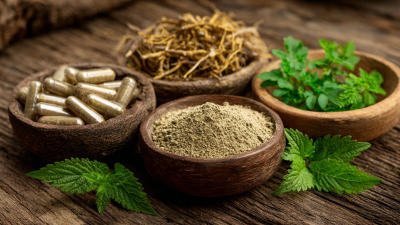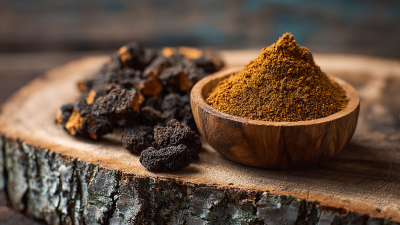In recent years, the global market for botanical extracts has witnessed significant growth, driven by the increasing demand for natural and organic products across various industries, including food and beverage, cosmetics, and pharmaceuticals. According to a report by Grand View Research, the botanical extracts market is projected to reach USD 2.16 billion by 2025, expanding at a CAGR of 7.9% from 2019 to 2025. This surge in popularity highlights the undeniable benefits of botanical extracts, which are valued for their therapeutic properties, flavor enhancement, and sustainability.

For businesses looking to capitalize on this trend, understanding how to effectively integrate botanical extracts into their offerings can unlock a wealth of opportunities and elevate their product appeal. This ultimate guide will delve into practical strategies for harnessing the potential of botanical extracts, enabling businesses to thrive in an increasingly competitive marketplace.
Botanical extracts are vibrant compounds derived from plants, known for their rich phytochemicals that contribute to various applications across industries. These extracts can be categorized into several types, including essential oils, tinctures, powders, and infusions, each offering unique benefits. Essential oils, for instance, are concentrated liquids obtained through distillation or cold-pressing that encapsulate the aroma and therapeutic properties of plants. Tinctures, on the other hand, are alcohol-based extractions that harness the medicinal qualities of herbs, making them popular in the health and wellness sector.
The applications of botanical extracts are vast and varied. In the beauty and skincare industry, these extracts provide natural solutions for anti-aging, moisturizing, and healing properties. In food and beverage, botanical extracts enhance flavors and offer health benefits, elevating the consumer experience. Moreover, the pharmaceutical sector relies heavily on these extracts for their potential therapeutic effects, paving the way for new herbal remedies. Understanding the definition, types, and applications of botanical extracts is essential for businesses looking to innovate and engage their audience with natural products.
| Botanical Extract | Type | Key Benefits | Common Applications | Source |
|---|---|---|---|---|
| Aloe Vera Extract | Herbal | Moisturizing, Healing | Skincare, Food Products | Aloe Barbadensis |
| Green Tea Extract | Herbal | Antioxidant, Anti-inflammatory | Cosmetics, Dietary Supplements | Camellia sinensis |
| Chamomile Extract | Herbal | Calming, Soothing | Skin Care, Tea | Matricaria chamomilla |
| Rosehip Extract | Seed Oil | Rich in Vitamins, Hydrating | Skin Care, Supplements | Rosa canina |
| Ginseng Extract | Root | Energy Boosting, Adaptogenic | Supplements, Beverages | Panax ginseng |
 Incorporating botanical extracts into your products can elevate both their appeal and effectiveness. One major benefit is enhanced skin health. Many botanical extracts, such as chamomile and green tea, are rich in antioxidants and anti-inflammatory properties, which can soothe irritations, reduce redness, and promote an even skin tone. By including these extracts, businesses not only improve the quality of their offerings but also resonate with consumers seeking natural skincare solutions.
Incorporating botanical extracts into your products can elevate both their appeal and effectiveness. One major benefit is enhanced skin health. Many botanical extracts, such as chamomile and green tea, are rich in antioxidants and anti-inflammatory properties, which can soothe irritations, reduce redness, and promote an even skin tone. By including these extracts, businesses not only improve the quality of their offerings but also resonate with consumers seeking natural skincare solutions.
Another advantage is the growing consumer interest in sustainability and clean beauty. Botanical extracts are often derived from renewable resources, making them an attractive alternative to synthetic ingredients. This shift towards clean, green formulations not only aligns with eco-friendly practices but also caters to a market eager for products that reflect their health-conscious and environmentally friendly values. By showcasing botanical extracts, companies can differentiate themselves and build a loyal customer base that prioritizes ethical consumption.
When sourcing high-quality botanical extracts for your business, it is essential to establish strong relationships with reputable suppliers. Look for suppliers who provide transparent information about their sourcing practices, as well as certifications for organic or ethically sourced materials. This not only ensures that you receive the best quality extracts but also aligns your business with sustainability values that resonate with today’s consumers. Conducting thorough research and asking for samples can help you evaluate the potency and purity of the extracts before making a commitment.
In addition to supplier relationships, understanding the extraction methods used is crucial. Different methods, such as steam distillation, cold pressing, or solvent extraction, can impact the quality and properties of the final product. Evaluate the method used to obtain the extracts to ensure they retain their beneficial compounds. Furthermore, stay informed about the latest trends and standards in botanical extract sourcing, as advancements in technology and changes in regulations can affect availability and quality. Emphasizing quality in your ingredient sourcing will not only enhance your product offerings but also build trust with your customers.
Botanical extracts are rapidly transforming the consumer goods landscape, offering brands a compelling avenue for innovation and marketing. As the global botanical extract market is projected to reach $52.8 billion by 2027, businesses can capitalize on the growing consumer preference for natural ingredients. Innovative marketing strategies, such as highlighting sustainability and traceability in sourcing, resonate strongly with today’s eco-conscious consumers. For example, promoting ingredient stories on packaging and digital platforms can build brand loyalty and trust.

Another effective approach is leveraging social media influencers who specialize in wellness and natural products. A recent study revealed that 70% of millennials are influenced by their peers' opinions on social media when making purchasing decisions. By collaborating with these influencers to showcase the benefits of botanical extracts, brands can effectively tap into their audiences. Additionally, incorporating user-generated content, such as customer testimonials and reviews, can enhance authenticity and engagement, driving sales and strengthening community ties around botanical extract-infused products.
In the competitive landscape of today's market, understanding and engaging consumers is paramount, especially when it comes to botanical extracts. By educating your audience on the health benefits and uses of these natural ingredients, you can significantly enhance customer engagement and loyalty. One effective strategy is to create informative content that highlights the unique properties of different botanical extracts, such as antioxidants in green tea or anti-inflammatory compounds in turmeric. This not only positions your brand as a knowledgeable authority but also fosters trust with your customers.
Interactive elements, like webinars and Q&A sessions, further deepen this engagement. As consumers become more aware of the attributes and applications of botanical extracts, they are more likely to make informed purchasing decisions. Providing samples or trial sizes can also encourage consumers to experience the benefits firsthand, turning curiosity into loyalty. By making education a cornerstone of your marketing strategy, you empower your customers and create a community around your brand dedicated to wellness and natural living.






2025 Bio-Botanica, a division of Bio Answer Holdings Inc. All Rights Reserved.